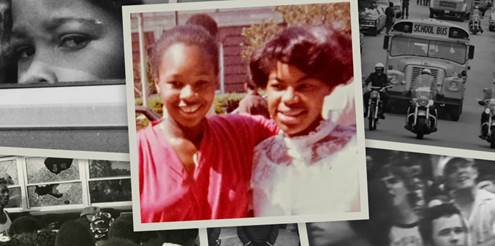On Wednesday, February 12th, Saint Anselm College hosted an event on equity in education to remember the desegregation busing mandate that took place 60 years ago. The event was a collaboration between Professor Jennifer Thorn and cohosts Michael Curry, President and CEO at the Massachusetts League of Community Health Centers and Chair of the NAACP’s National Board’s Advocacy and Policy Committee, and Woullard Lett, head of the Education Equity committee at the Manchester branch of the NAACP.
At the start of the event, the cohosts gave insight into their personal experiences with school systems and the influences they have had on their journey toward equity in education. Next was a viewing of the 23-minute film “Never Cried” (WGBH) detailing the Boston bus crisis of 1974 and a Q&A discussion where audience members were encouraged to share their own thoughts, hopes, and experiences surrounding the goal of educational equity.
Professor Thorn was inspired by Michael Curry as, at the time, he was speaking on the radio station WGBH about the Boston busing crisis’ 50th anniversary. Thorn said, “He spoke eloquently about his own experience, as a very young boy, of being bussed from Roxbury to a school in Charleston. His words made clear how much the decision of a federal judge that Boston had to desegregate his schools affected daily life in Boston and marked the kids involved in it forever.”
The National Association for the Advancement of Colored People, or the NAACP, did instrumental work in the civil rights era, and is a group that Thorn “greatly respect[s].” Curry’s outstanding resume as the CEO and president of the Massachusetts League of Community Health Centers, as well as being a member of the national board of directors for the NAACP, made him a clear candidate for someone whose voice deserves to be heard at Saint Anselm College.
Professor Thorn has worked with the Intercultural Center’s Wayne Currie before to create programming events for students, faculty, and community members. After pitching the idea to Currie, Thorn “joined the Manchester branch of the NAACP and came to know the tireless and vital work that Woullard Lett, head of the Education Equity in the branch, has done for many years.”
Woullard Lett, the second cohost of last Wednesday’s event, along with Curry made the perfect team for the type of event that Thorn was looking for. Thorn said, “We thought that these two men’s wisdom, knowledge of many communities over many years, and awareness of ed policy, would make a great frame for an event that also let the audience see an impactful short film about the 1974 busing crisis that WGBH had just released.”
Thorn talked about the importance of hosting an event like this, commenting that, “America has wonderful ideals—as Thomas Paine said, that ‘in America, the law is king,’ and that ours is a nation committed to liberty and justice for all, which holds as self-evident that all men are created equal. We have come far in living fully up to these ideals—slave-holding is behind us, and women have the vote,” but that, “There is always value in reaching to understand the pain felt all around in times of great change, in hopes of doing better at pulling together for the sake of the next generations—the young ones who will be in charge, in time.”
Educational equity, as defined by Thorn, means that “all children have the resources and support needed to grow and succeed, no matter what their backgrounds or abilities might be.” This is especially relevant in the Manchester community, as many students know the outreach that the college is committed to providing. For example, disadvantaged students on the West side of Manchester can take high school classes taught by Saint Anselm students or visit the Saint Raphael Parish that the school is involved with.
Professor Thorn said the event was designed to be “very open and centered in discussion.” In other words, this was a low-stakes, educational event where students could come together and listen to one another. Thorn’s favorite part about an event like this is “hearing students’ responses, learning from them, being part of a group of folks thinking things through together—even if no big solutions come from the discussion!”
Summing up the event, Professor Thorn described the occasion as “two people wise from experience, friendly, great speakers and listeners, with the chance to hear the voices and see the vibrant lives of two sisters who were bussed, one now a grandmother—and then open conversation: different media giving different perspectives on the experience and what we can learn from it.”
Saint Anselm students are offered educational events such as the educational equity event on a regular basis and, according to Thorn, would benefit from attending some of them once in a while. She said, “We all have opportunities every day not to be bystanders, to act in the face of those intending harm to the vulnerable. That’s not easy to do! It’s good to lean toward it by seeing examples of how it’s been done, which gives hope and strength.”


